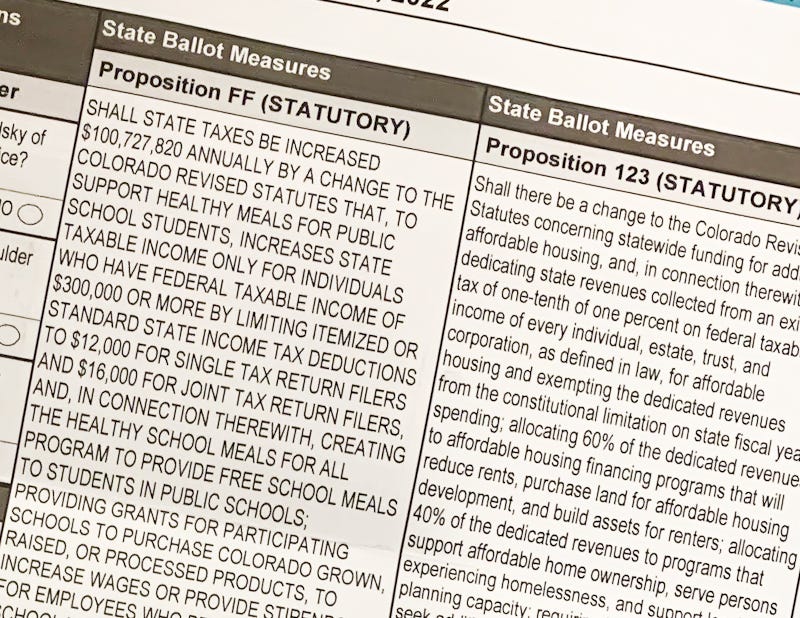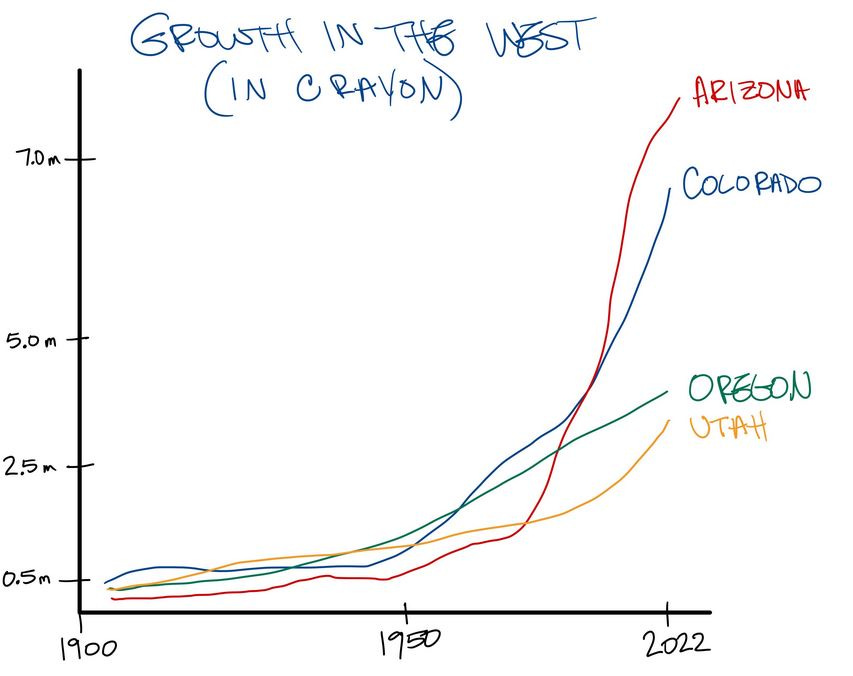Elections in the West are now entirely driven by transplants
In the some circles, colonization is an activism war-cry, but as the West grows rapidly with cultural urbanites, elections no longer reflect the minds, values, people, and environments of the West.
We just made it through another midterm election, and as I reviewed the propositions, candidates, and all of the other things we were voting on, I realized that our local elections in Colorado and much of the West no longer belong to the people rooted here. All of our election topics now reflect non-local perspectives, serve non-local people, and help to curate all the political accoutrements of the transplants’ home areas ... here.
Voting in the West has changed, changed quickly, and now our entire menu of new policies, taxes, and even the candidates selected share no semblance of our political-cultural norms.
What I’m pointing to really came into focus for the 2022 mid-term election. We had a statewide “affordable housing” tax on the ballot, an incremental step toward decriminalization of psilocybin mushrooms, and a wide range of politicians who are a direct reflection of today’s urban and coastal American politics.

The interesting thing about many of the movements we’re seeing in places like Colorado right now is that they aren’t necessarily happening elsewhere. You’ll notice that Illinois isn’t leading the charge for legalizing magic mushrooms – only the ‘resort states’ seem to be doing this. It’s not everybody — it’s just the places with almost entirely new populations.
But that’s it – These movements, whether right or wrong, are being initiated and driven by people who have found the West’s somewhat anti-interference governance cultures and structures easy to influence. Much easier than places like New York, California, or Pennsylvania – places that have policy structures that are not as malleable, and may have accomplished political sclerosis decades ago.
The scent of the political change in the West extends to the people running for office. Until a very distinct and recent point in history, Colorado’s politics weren’t even purple (fairly evenly blended blue and red). They were more like forest-green and chartreuse.
We didn’t fit the disconnected urban Blue mentality, and we also didn’t fit the deep-fried-uneducated bumpkin Red mentality. We were somewhere outside the American political dog-bone, and not even our political dog-boners were as party-aligned as they have to be today to get the transplant vote.
Boiling down a couple hundred years of political development in the interior West to a quick statement; Most of us and our foreparents were generally voting to ensure the center of the West was the place itself, we typically wanted a well-balanced and out of the way government, and we tended to appreciate the non-urban life. Most of all, we didn’t want any of what the rest of the country had, and were damn proud of that.
An example of that mentality is in how Colorado absolutely didn’t want the Olympics – only the transplants, even at the time, wanted that shitshow – and we locals didn’t just vote against it, we voted against politicians who even whispered support for it, we protested against it, and to this day will just about assault someone if they mention bringing the Olympics to Colorado.
The sad thing is; We really just voted to keep levels of personal freedom high, we voted to keep taxes as low as possible (with some notable exceptions), including TABOR; We typically voted for things that we thought made our environment better. The big problem is; In the environment and governance image we crafted over time, it appears we incidentally made Colorado extremely easy for others to want to come to – including those many of us vehemently disagree with.
In voting for what made our State feel like a great place to live for our few-selves, we also happened to open a door that helped to convert Colorado and the rest of the West into something where even urbanites, who once disregarded the entire region as ‘flyover country,’ could come and decide they could make it just a little bit their own and believe that they belong here.
Everyone will have a different point in history where they’ll recognize this change in places throughout the West, but the point where I think the tables really turned for Colorado was sometime in the early 2000s. We went from having a pretty low-key, different, and somewhat centered political landscape to something … else.
At that point, the urbanization that had been invisibly seeded hadn’t fully taken root, and so the divide between the agricultural parts of the state and the urban areas were not yet as black and white as they are today. Until the early 2000s, we didn’t seem to have the state government funding promotion and marketing of the state nationwide, and they were not yet using taxpayer funds to “brand” the State and sell it out.
Colorado’s international airport (DIA - Denver Intl. Airport) was an event that marks the start of big political changes, too. Interestingly, the airport was opposed by many residents and politicians, and Colorado was making news for potentially being the first state in the nation to turn-down and scrap a project like that. Yeah, we didn’t want it. Since DIA was voted on sometime in the late ‘80s, it signals that the scales invisibly tipped around then, which also happens to be a time of a highly accelerated growth rate in Colorado.
This might sound like a case of “old Colorado” clashing with “new Colorado.” We are at a point in history that makes the perspective shift even more odd. The people we could group as “old Colorado” were very likely to have known the state before full-scale park-ification, urbanization, and museum-ification of basically every space. They probably did jobs outdoors, may have lived in rougher conditions, and probably truly appreciated the state for what it was and for its environment.
Those who comprise “new Colorado” probably showed up for the urban spaces (the familiar), maybe the image the mountains offered (the novel), and the fact that there is finally enough familiar infrastructure for them to feel safe or at home here. The two archetyped groups have fundamentally different cultural understandings of place and what’s desirable and not.
Given the big political, social, economic and environmental shifts, and the point in time that I’m suggesting was a big tipping point, the recent election was a hard one to study and experience. My cultural identity is rooted from the West before millions of people showed up. The things I like, my values, and my political opinions basically all center on a place with fewer than a half-million people. And, sure, I’m a hybrid of my family’s history and when I was born, but even then, there were something like half as many people here than there are today. These big shifts have brought in a viral load of political views that now out-number the rooted locals in our elections.
Since Colorado’s population has more than doubled in about 30 years, we now have one completely new voter for every person who has been here longer than 30 years (at minimum). On the scale of a human lifespan, we now have multiple transplants voting in local and State elections for every rooted local. If I had to guess (and I’m going to), I would estimate that the recent election had five to seven transplant voters to every deeply rooted local. You’re allowed to disagree, but I bet I’m in the zone – and if I’m even a quarter right, that’s still shocking.

I’m not always convinced having a geographically rooted mindset is valued anymore. Most Americans don’t seem to self-identify with a geography, unless they found it pretty and decided to call it theirs (“honorary natives” as they call themselves … the horror, please stop.)
But I also recognize that the lack of a geography-rooted identity breeds disconnection and ignorance. Ironic, given the self-superiority complexes that young, urban professionals are invariably granted by the Wizard of Oz via their [poison] Ivy-league scarecrow dipolomas.
I suppose this all comes down to my initial thesis – that our elections appear to have been colonized. Elections in the West are now colonized in topics, issues, mindsets, attitudes about things like taxes, services we want governments to provide, and by the numbers of people not from a place who are now voting in our place. I know, we don’t typically use colonization to describe American-on-American political warfare, but in a place with population doublings every 30 years, it seems to be the most apt term.
At what point are locally-rooted politics completely diluted and washed out by rapid migration patterns that fully overwhelm the local vote? Is it one to one? Two to one? Seven to one?
In the end, the 2022 midterm election was the first one that I very clearly recognized as being a fully colonized election. By that, I mean colonized by urbanite transplants who now have majority voting power in our region to select politicians that more directly reflect themselves than the locals – and how the politicians are now selected to serve the urbanite vision for how Colorado and the West should look, feel, and operate. The great irony is that whatever we Westerners were doing in prior elections, we made the place look great to the rest of the country. Western states are the fastest urbanizing states in the entire country and have taken the top of the podium in the growth race for a couple decades now. The irony of that race being total conversion into something else that many of us view as being entirely undesirable and unlivable.
The Fleeting West is written by a culturally rooted westerner interested in the political colonization of the West by urban politics, and watching and pondering what the hell is happening to what was once a fine place to live.





Yep. I've been in New Mexico since I was 13, but my parents were from here, and my grandparents moved here post WWII, so I feel like I count as a native. (I'm certainly not truly native to anywhere else either, being a military brat.) And I've definitely seen exactly what you're talking about down here, too, though thankfully not quite as much since it's still pretty undeveloped. Though being poor just means it's easy to influence our elections with outside money. So we have quite a few elected officials who are there courtesy of Mike Bloomberg, who is very much *not* a New Mexican.
"If you liked how it was on the coast so much, feel free to go the fuck back there." Probably too long for a bumper sticker. ;)
Interesting thoughts. I think the term colonization is appropriate for what you describe. I currently live in New Mexico, but grew up in Nashville, Tennessee and when I go back there to visit I see something similar happening to Nashville. The Nashville I grew up in during the 1960s & 1970s had the feel of a big small town. Over the past 10 years since I left the area it has transformed with entire neighborhoods seeing their characters completely changed. Nashville was a moderate Democrat town that now seems to be turning hard left. It no longer feels like home to me.